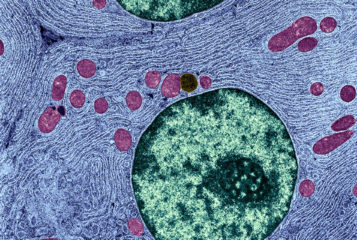Radio Review: In Our Time – Mitochondria
Luke Steventon reviews a radio programme about mitochondria, which are described as producing energy production levels of '30 million volts per metre – like a bolt of lightning'...
A reproductive option that was developed for the purpose of avoiding the transmission of mitochondrial disease from mother to child. It involves creating an embryo using nuclear DNA from the prospective parents, and mitochondria (including mitochondrial DNA) from a donor. It is sometimes referred to as MDT (which stands for 'mitochondrial donation treatment') or as MRT (which can stand for either 'mitochondrial replacement therapy' or 'mitochondrial replacement techniques'). There are also specific mitochondrial donation techniques that have their own acronyms.

Luke Steventon reviews a radio programme about mitochondria, which are described as producing energy production levels of '30 million volts per metre – like a bolt of lightning'...

The birth of the first UK child(ren) with donated mitochondria has been confirmed by the Human Fertilisation and Embryology Authority...

by Professor Catherine Mills and 1 others
Professor Catherine Mills and PhD candidate Ezra Kneebone from Monash University, Australia discuss the critical shortages of eggs available for fertility treatment and put forward a proposal to counteract this shortage, for both reproductive and research purposes...
by Hannah Flynn
Embryos containing donated mitochondria, created via a method intended to avoid the transmission of mitochondrial disease, seem similar to those created via IVF with ICSI...

How responsive is the Human Fertilisation and Embryology Act to the pace of social and technological change? In this comment, Julian Hitchcock contemplates revision of the Act, and how might we optimise its responsiveness to clinical need while upholding standards...

The question of what is a 'permitted embryo' under the legislation governing assisted reproduction in the UK has received increasing scrutiny as technological progress challenges the concept of embryohood...

by Karinne Ludlow and 1 others
In this commentary, we consider the road to legalisation in Australia, the key aspects of this legislation, and some remaining unanswered questions...

The Australian Senate has passed a bill which will legalise the clinical use of mitochondrial donation by a vote of 37 votes for to 17 against...

A bill permitting mitochondrial donation has been passed by the Australian House of Representatives...

Australia is on the cusp of legalising mitochondrial donation...
BioNews, published by the Progress Educational Trust (PET), provides news and comment on genetics, assisted conception, embryo/stem cell research and related areas.

